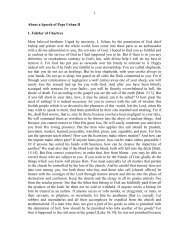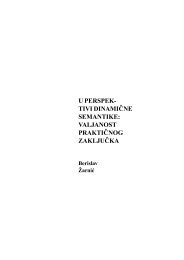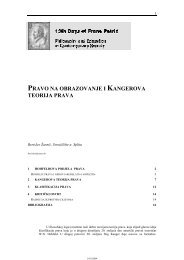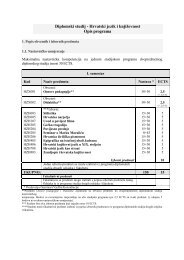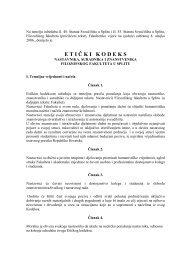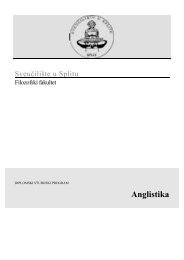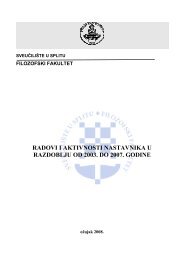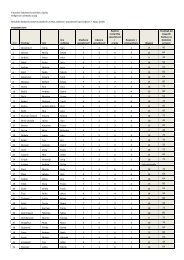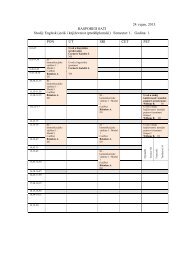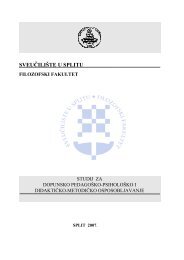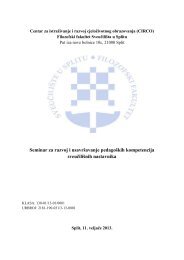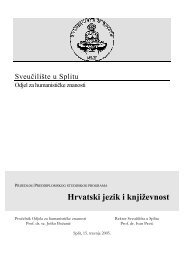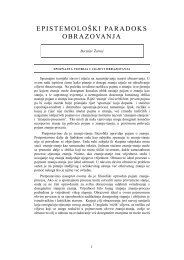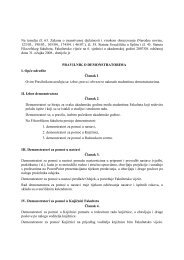English Studies
English Studies
English Studies
Create successful ePaper yourself
Turn your PDF publications into a flip-book with our unique Google optimized e-Paper software.
G R A D U A T E D E G R E E P R O G R A M M E : E N G L I S H S T U D I E S<br />
Course title Literary translation – Module 1<br />
Course code HZE809<br />
Type of course Seminar / Advisory hours<br />
Core course (Elective course in 3.1.1. and 3.1.3.)<br />
Level of course Specialised level course<br />
Year of study Second Semester Three<br />
ECTS<br />
(Number of<br />
credits allocated)<br />
3 ECTS<br />
Contact hours (25 seminars + 5 advisory hours) = 0.75 credits.<br />
Student study time (67.5 hours) = 2.25 credits.<br />
Name of lecturer Mia Pervan, MA, Senior Lecturer, Professional Translator<br />
Learning<br />
outcomes and<br />
competences<br />
After successful completion of this module, the student is expected to have:<br />
- the ability to demonstrate knowledge and understanding of the concepts,<br />
principles and theories related to the subject of literary translation;<br />
- the ability to deal with specific problems of translating texts from earlier<br />
periods;<br />
- the ability to start work as a literary translator.<br />
Prerequisites 1. Competences and skills acquired upon the completion of the<br />
undergraduate degree programme <strong>English</strong> language and literature;<br />
2. The student’s grade point average in the 3rd year core courses (<strong>English</strong><br />
Language and Literature) should be at least 3.5.<br />
3. Reasonable talent for creative writing.<br />
Course contents Introduction to the history and theory of literary translation and to various<br />
approaches to literary translation. Introduction to specific genre areas<br />
(novelistic prose, essay). Introduction to translation problems specific to<br />
literary texts from earlier periods.<br />
Practical work carried out through a variety of assignments (translation of<br />
shorter literary texts belonging to various genres and historical periods).<br />
Workshops: translation of different literary texts in pairs or smaller groups.<br />
Development of assessment techniques. Practical guidance on how to start<br />
Recommended<br />
reading<br />
Supplementary<br />
reading<br />
work as a literary translator.<br />
Bassnett, S. (1991). Translation <strong>Studies</strong>, Revised Edition. London:<br />
Routledge.<br />
Bonačić, M. (1999). Tekst, diskurs, prijevod. Split: Književni krug.<br />
Bratulić, J. (ed.) (1990). Sveti Jerolim, Izabrane poslanice. Split: Književni<br />
krug.<br />
Newmark, P. (1988). A Textbook of Translation. London: Prentice Hall<br />
International.<br />
Evan-Zohar, I. (1990). Polysystem <strong>Studies</strong>. Special issue of Poetics Today<br />
11.1.<br />
Popovic, A. (1976). Dictionary for the Analysis of Literary Translation.<br />
Edmonton: Department of Comparative Literature, University of Alberta.<br />
Teacher-generated materials dealing with the quality of published<br />
translations of eminent Croatian translators as well as with the evaluation<br />
of a number of different translations of the same text.<br />
53



